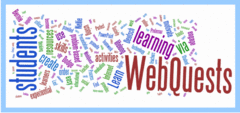Webquests
Contents
WebQuests
Webquests are inquiry oriented lesson formats that encourage learners to find necessary information from the web. The learners may then complete an assignment and send the same to the tutor or display it on the web for all other learners to see. This constructivist way of learning ensures building an interest in the topic. It also capitalizes on the premise that 'learning means making meaning out of something you interact with'.
Rationale
Today's students need constant challenges in order to focus. WebQuests are problem-based learning activities that engage students in learning. Engage your students in experiential (hands on) learning activities that promote social skills via teamwork, higher order critical thinking skills via inquiry and problem-based learning, and technological skills via the Internet and Microsoft applications. Motivate your students to become lifelong learners by using WebQuests.
Definitions
Professor Bernie Dodge, the father of Webquests, defines them as "inquiry-oriented activities in which some or all of the information that learners interact with comes from resources on the internet".
Layout
The WebQuest is divided into 7 sections. I provided examples from The Perfect Society.
- Introduction
- Task
- Process
- Resources
- Evaluation
- Conclusion
- Teacher Page
Procedure
Students generally work in teams. Each student has a role, or a specific area to research. WebQuests often assign students to play real-life situations of professional researchers or historical figures.
Lesson Plans
Lesson Plan for a WebQuest on The Last Spin, a short story by Evan Hunter. The literature-based WebQuest was created by Nellie Deutsch.
Literature-based WebQuests
- The Perfect Society WebQuest is based on the futuristic novel by Lois Lowry.
- Apples from the Desert WebQuest, a short story by Savyon Liebrecht.
- The Last Spin WebQuest, a short story by Evan Hunter.
Resources
Example of a WebQuest
Here is an example of a webquest on 'Global Warming'
Introduction
Imagine that you live in a coastal town which is threatened by decreasing coastlines. A number of low lying coastal areas experience flooding. The fisherfolk complain of lack of a good catch...You have to explore the reasons for the same and present it to the local community.
Task
As a concerned citizen, you explore sites which will give you information on
- global warming
- effects of global warming
- measures to reduce global warming
You may look at the following sites or go on to other relevant sites.
- http://www.pewclimate.org/global-warming-basics/kidspage.cfm
- http://tiki.oneworld.net/global_warming/climate8.html
- http://climatehotmap.org/harbingers.htm
Process
After having done your own little research, prepare a powerpoint presentation that will explain to your community causes and effects of global warming. Present the same to your classmates and ask them to pretend to be residents of your town. Do they have any queries? Try and answer their queries on the basis of what you have researched.
Evaluation
Evaluate your performance on feedback you receive from your classmates and from your teacher.
Action
Think globally and act locally by preparing posters on global warming. Along with your classmates, prepare slogans to create awareness about global warming. If you are part of any social networking community like Facebook,display two actions you will take to help reduce global warming. Invite reactions from your friends.
Webquests of the above kind ensure learner-centricity. Educators can create their own webquests and put them up in a repository for students all over the world to use.
